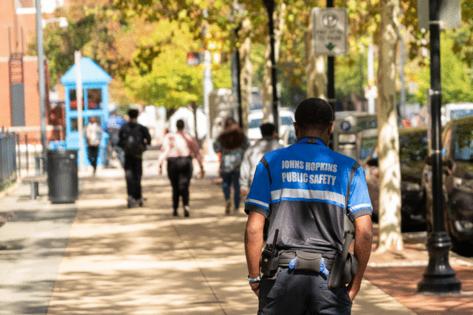Maryland overhauled standards for private security. Bouncers and other guards are exempt.
Published in News & Features
Responding to a spate of fatal shootings by security guards, Maryland lawmakers passed new standards and oversight procedures for the profession. But unarmed bouncers working for bars and restaurants were not included in the reforms, and private security employed by casinos and health care facilities just became exempt this month.
Advocates for the overhaul wanted the new standards — which include mandatory training, background checks and use-of-force reporting — to apply across the profession. Restaurant and bar bouncers were excluded from those regulations in the final package of reforms that reached Gov. Wes Moore’s desk in 2023, and last-minute legislation passed this year carved out more exemptions.
The new exemptions took effect Oct. 1 — the same day that a Baltimore bouncer turned himself in following a viral video showing him choking a Loyola University Maryland student and slamming his head through a car window outside a Federal Hill bar on Sept. 27 prompted calls for accountability. The bouncer, 41-year-old Kevin Weaver, is being held in jail on first- and second-degree assault charges. Last week the student sued Weaver, ACE Event Services Group, the security company that employed him and another bouncer who is also being sued, and two LLCs associated with the bar, Cross Street Public House. The lawsuit seeks damages for “permanent and debilitating” injuries, including depriving the brain of oxygen while the guard had him in a chokehold, as well as a “severe” concussion leading to a traumatic brain injury.
“No matter what the location, if [a Maryland] entity is employing persons to perform security services, that person should be licensed, vetted and trained,” said Steve Amitay, executive director of the National Association of Security Companies. “I think that’s very common sense, it’s reasonable and it promotes public safety.”
The standards implemented this year require most guards to receive 12 hours of initial training as well as mandatory continuing education to renew their licenses. The laws also require agencies to report uses of force on the job to Maryland State Police within 48 hours. It was unclear whether or not the brawl recorded in Federal Hill was documented in such a report; a state police spokesperson would only confirm that the agency “is in contact with [Baltimore Police] to investigate the incident.”
The reporting requirements allow more oversight of repeated uses of force by security guards, and the licensing system gives the state the ability to pull licenses for “bad behavior,” said Amitay, whose Washington, D.C.-based organization championed the 2023 legislative overhaul.
The latest carve-outs were added onto a bill regarding security guards in the cannabis industry — Amitay said the bill was a technical correction that was “hijacked,” removing casino and hospital guards through an amendment. Committees in the House of Delegates and the Senate had added the amendment a few days before this year’s session of the Maryland General Assembly adjourned.
Del. Elizabeth Embry, who sponsored the security guard licensing bills, said the legislative overhaul has required “compromises along the way.”
The Democrat from Baltimore said that the exclusion of bouncers “was not my decision,” but instead an amendment offered by the House of Delegates’ Economic Matters committee during the 2023 session. The committee’s chair, Del. C.T. Wilson — who said in committee that he paid for law school by working as a bouncer — did not return a request for comment. Amitay’s group “did not agree with that exception” but believed it was worth making for the “greater good” of getting the bill passed, he said.
Casino employees are already “subject to a somewhat different structure” under the state’s gaming commission, Embry said, and hospitals are also separately regulated, but their guards are “now fully excluded, which, again, was not my choice.”
The health care industry had communicated concerns about the laws in 2023, though legislators ultimately included those security guards in the reform package. The Maryland Chapter of the International Association of Healthcare Security & Safety wrote to legislators highlighting that guards at health care facilities already faced oversight from the state and federal government. They called the use of force reporting requirements an “undue burden,” noting that a typical healthcare facility could have roughly 500 “combative patient” calls annually.
Del. Pam Beidle, who sponsored legislation this year to exempt hospital and casino guards, said the carve-outs were due to “redundant” training and licensing requirements from other agencies. Casino guards are mandated to report uses of force to the Maryland State Lottery & Gaming Control Agency, and all casino employees must pass a background check to be licensed.
Amitay said that having a system separate from the rest of the security industry makes it harder to keep oversight and require across-the-board training on topics such as de-escalation.
“Obviously, I think the casinos have a lot of political clout,” he said. “They carved themselves out of what was a very commonsense law, without really anyone knowing that this was going to happen.” Spokespeople for the state’s largest casino, Maryland Live!, and hospital, Johns Hopkins, did not return requests for comment.
Embry said that despite the carve-outs, she was “happy about the progress we’ve made” passing and implementing the legislation, and was looking forward to seeing “how it plays out.”
“I think we need to let it take effect and work out any wrinkles, and then we can revisit some of the exclusions.”
________
©2025 The Baltimore Sun. Visit at baltimoresun.com. Distributed by Tribune Content Agency, LLC.







Comments